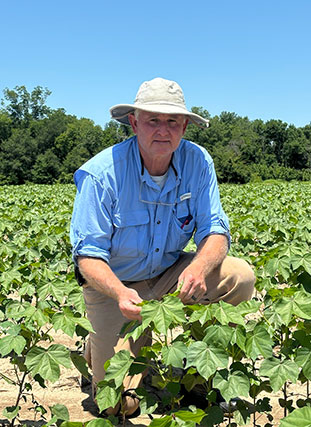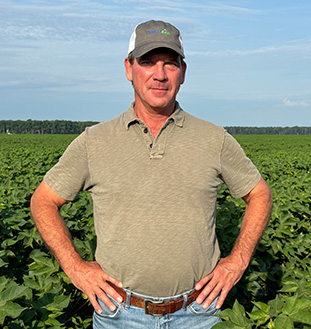INDUSTRY CONVERSATIONS CONTINUE ON DICAMBA ALTERNATIVES
It’s a conversation Southern farmers can’t avoid. At turnrows and tailgates, field days and farm shops, the question comes up repeatedly: “What’s the latest on dicamba?”
It’s a conversation Southern farmers can’t avoid. At turnrows and tailgates, field days and farm shops, the question comes up repeatedly: “What’s the latest on dicamba?”
Speculation often creates more questions than answers, and producers are looking for new solutions to bring stability to uncertain times. For many, the conversation has taken a turn in a more certain direction: It’s time to give the Enlist® weed control system another look.
Rogers Leonard, Ph.D., is a crop consultant in Louisiana — a second career after retiring as associate vice president of ag research and extension programs with the LSU AgCenter. As a past researcher and now consultant, Leonard believes growers need good options for diversification and risk management, whether they’re looking at variety performance or weed management programs.

“We need good options to diversify varieties and herbicide systems, because it will help with both yields and weed resistance management,” Leonard said. “We have found some PhytoGen cotton varieties that perform well in our area, and the Enlist weed control system is effective against our spectrum of resistant broadleaf weeds. We could see an increase in more acres of the Enlist system because of the current situation with dicamba.”
PhytoGen® W3FE varieties have resistance to the 2,4-D choline in Enlist® herbicides, as well as glufosinate (Liberty® herbicide) and glyphosate. Leonard says the option to choose multiple herbicides according to a grower’s specific needs creates opportunities for good weed management.
“With the Enlist system, you can use Enlist One herbicide and other products, such as glufosinate and glyphosate — and the option to tank-mix Enlist One with those other products if needed,” Leonard said. “We can pick and choose the herbicide applications that best fit our fields. That gives growers more flexibility, and flexibility is so important right now.”
That flexibility carries over to soybeans as well. Growers can plant Pioneer® brand Enlist E3® soybeans with the same tolerances to Enlist herbicides, glufosinate and glyphosate. Enlist E3 soybeans are the No. 1 selling soybean herbicide trait system in the U.S., continually gaining more acres in the Southern states.
Whether farmers are spraying Enlist herbicides over PhytoGen® W3FE cotton or Pioneer brand Enlist E3 soybeans, many first-time applicators wonder if 2,4-D choline really is different from traditional 2,4-D. Leonard says the difference is night and day.
“With Enlist herbicides, the technology gives us the ability to keep our applications much more on target when following the proper application guidelines. That is an important point for growers to know.”
As farmers plant newer PhytoGen W3FE varieties and use Enlist herbicides, they’re learning that the Enlist weed control system is a viable solution — and the high yields provide added stability to market uncertainty.

John McClintock farms in the Mississippi Delta near Holly Bluff. In 2023, he planted a couple hundred acres of PhytoGen® brand varieties, because his yields with a competitive variety weren’t meeting his expectations. His yields with PhytoGen® brand PHY 411 W3FE were so high that he planted all his cotton acres to PhytoGen® brand varieties in 2024.
“PHY 411 was exceptional — we picked close to 1,700 pounds per acre, and I was yielding about 1,300 pounds per acre with the competitive variety,” McClintock said. “PHY 411 fruited early and had good retention. By midsummer, I knew it would be a good crop if the weather didn’t take it.”
In 2024, McClintock planted several other PhytoGen W3FE varieties to find the best lineup for his fields. He placed varieties in different soil types, learning where the varieties have the best fit on his farm.
He’s also gaining more experience with the Enlist weed control system. He said the system has helped him manage weeds, especially the hard-to-control pigweeds that Southern growers fight every year. He took advantage of the multiple herbicide tolerances, using both Enlist One® herbicide and Liberty herbicide in sequential applications.
McClintock said there has been a learning curve with Enlist herbicides, something growers expect when switching to a new herbicide system.
“When we started planting glyphosate-resistant varieties years ago, we had to learn a new system. Now we’re doing the same thing with Enlist,” he said. “You don’t want to apply when it’s too windy, but you also don’t want to apply when it’s completely still or during a temperature inversion.”
According to the label, the recommended wind range for applications of Enlist One herbicide is 3 mph to 10 mph. Applications should not be made when wind is above 15 mph or during a temperature inversion.
He’s also adjusting his herbicide program based on what he’s learned. He bought air-induction flat-fan spray tips that are recommended for Enlist herbicides, and he’s tank-mixing Enlist One with other approved herbicides to take full advantage of the system.
“The weeds aren’t going anywhere, and the Enlist system gives me options to control them with Enlist One and Liberty herbicides,” McClintock said. “And the yields are great with PhytoGen cotton.”
Find information on yield and more in the PhytoGen Cottonseed Agronomy Library.
™ ® Enlist, the Enlist Logo, Enlist One, PhytoGen, and the PhytoGen Logo are trademarks of Corteva Agriscience and its affiliated companies. Enlist Duo® and Enlist One® herbicides are not registered for sale or use in all states or counties. Contact your state pesticide regulatory agency to determine if a product is registered for sale or use in your area. Enlist Duo and Enlist One are the only 2,4-D products authorized for use with Enlist® crops. Consult Enlist® herbicide labels for weed species controlled.
Roundup® and Roundup Ready® are trademarks of Bayer Group. ALWAYS READ AND FOLLOW PESTICIDE LABEL DIRECTIONS. Roundup Ready® technology contains genes that confer tolerance to glyphosate, an active ingredient in Roundup® brand agricultural herbicides. Agricultural herbicides containing glyphosate will kill crops that are not tolerant to glyphosate. ©2024 Corteva. COR (08/24)